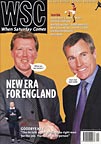 Michael Richardson thought it was all over in 1966. Haydn Parry reveals the man on the Wembley pitch.
Michael Richardson thought it was all over in 1966. Haydn Parry reveals the man on the Wembley pitch.
English football, Ken Wolstenholme and Geoff Hurst in particular, owe Michael Richardson a peculiar debt. For, as Wolstenholme stared down incredulously from his gantry at the impromptu pitch invasion prior to the fourth goal and final whistle in 1966, it was a young Mr Richardson who was doing his stuff, upstaging the main event in the top left hand corner of the nation’s TV screens. Michael’s 15 seconds of fame came at the age of 18, although these days he still has a public profile, of sorts, as the drummer in Elkie Brooks’s band (ask your parents).
Michael vividly recalls clambering over people to get on the pitch and can remember the team’s lap of honour after the presentation of the trophy – but he couldn’t tell you much about Sir Geoff’s coup de grâce: “I did miss Hurst’s goal at the end – at the time six policemen had grabbed my arms and legs and were about to gently deposit me back in the crowd.”
So what had possessed him to make the short jump over the wall and intrude cheekily into the greatest moment in English footballing history? “I was sat more towards the ‘crossbar’ goal side of the pitch. I could see that a couple of people were already making moves to go on to the pitch, they obviously thought it was the end of the game, so I went for it. I jumped out on to the field and went off celebrating, with the policemen chasing after me. The whole thing lasted for about a minute.”
That Michael made it to the game at all was down to the lack of interest of a fellow musician, who obviously had more interesting things to do in the Sixties than watch England win the World Cup: “I only got the ticket for the match just the night before from a keyboard player in a pop group I was in at the time, Gulliver’s People. He just didn’t fancy going, so he sold it to me for a fiver. That was well over the odds in those days – a fiver was a lot of money for me – but I jumped at it. I went to the match on my own. Of course, I didn’t regret it but when the Germans had equalised in the last minute I admit I was in tears.”
Prior the England v Germany World Cup qualifier on October 7, Michael went a stage further than he had 34 years earlier when, as an unlikely guest of the BBC on a special Radio 5 Live outside broadcast prior to the game, he finally got his hands on that match ball. He confesses that music rather than football has dominated his life since 1966 and remarkably, considering his glorious bit part in World Cup history, he “doesn’t go to too many games these days”.
Fittingly, after a career mixing a unique cocktail of pitch invasions and rock and roll, Michael these days resembles a hybrid of Keith Richards and Kevin Keegan, although it’s fair to say he’s better preserved than the former and a lot more relaxed about life than the latter.
He’s still amused that he got off so lightly: “Back then I didn’t get into any trouble. Just a mild ticking off from the coppers and then I was put back in the crowd from where I had run on. The mood was just fantastic. That night I had to go back to Shaftesbury Avenue where I was working, playing in a band at a club called Tiffany’s. So there I was, the same evening England had won the World Cup, walking through Piccadilly Circus where everyone was partying after the game and it was crazy – a great night. In fact, it was the best night of my life.”
From WSC 166 December 2000. What was happening this month